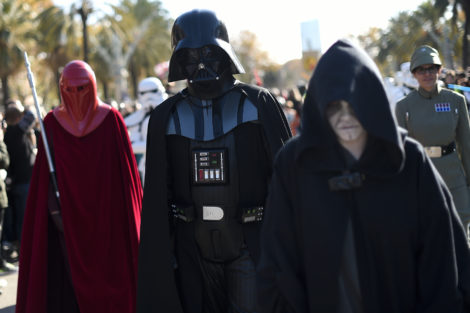Why are some people drawn to fictional villains?

A participant dressed up as Star Wars saga movie’s character Darth Vader (center) marches during the 9th Star Wars parade in Barcelona, on Nov. 29, 2015. Image: AFP/Josep Lago via AFP Relaxnews
If you’ve been binge-watching TV shows and movies during the COVID-19 lockdowns and noticing yourself identifying with the baddie more than the hero, it might be a reflection of your own personality traits, according to new US research.
Carried out by researchers at Northwestern University, the new study analyzed data gathered from the website CharacTour, an online entertainment platform that had around 232,500 registered users at the time of the research.
One of the website’s features is a personality quiz that allows users to see how similar they are to characters who are villains, such as Maleficent, The Joker and Darth Vader, or nonvillains including Sherlock Holmes, Joey Tribbiani, and Yoda, and that allowed the researchers to see if users were attracted to or repulsed by villains who had similar personality traits to themselves.
The findings, published in the journal Psychological Science, showed that unsurprisingly, the participants were more drawn to the nonvillains as their similarity to them increased. However, the team also found that users were also more drawn to the villains who they also shared personality traits with.
The researchers explain that the fictional world of baddies is a “safe” place to identify with those who we would normally be repulsed by in real life, without tainting our self-image.
“Our research suggests that stories and fictional worlds can offer a ‘safe haven’ for comparison to our darker selves,” says lead author Rebecca Krause. “When people feel safe, they are more interested in comparisons to negative characters that are similar to themselves in other respects.”
“People want to see themselves in a positive light,” continues Krause. “Finding similarities between oneself and a bad person can be uncomfortable.”
Co-author Derek Rucker also explained, “When you are no longer uncomfortable with the comparison, there seems to be something alluring and enticing about having similarities with a villain.”
“For example, people who see themselves as tricky and chaotic may feel especially drawn to the character of The Joker in the Batman movies, while a person who shares Lord Voldemort’s intellect and ambition may feel more drawn to that character in the Harry Potter series,” adds Krause.
“Perhaps fiction provides a way to engage with the dark aspects of your personality without making you question whether you are a good person in general,” she concludes. CL
RELATED STORIES:
Next ‘Venom’ with Tom Hardy postponed until 2021, but movie title revealed
Screen time is not affecting kids’ social skills, says evidence from new study